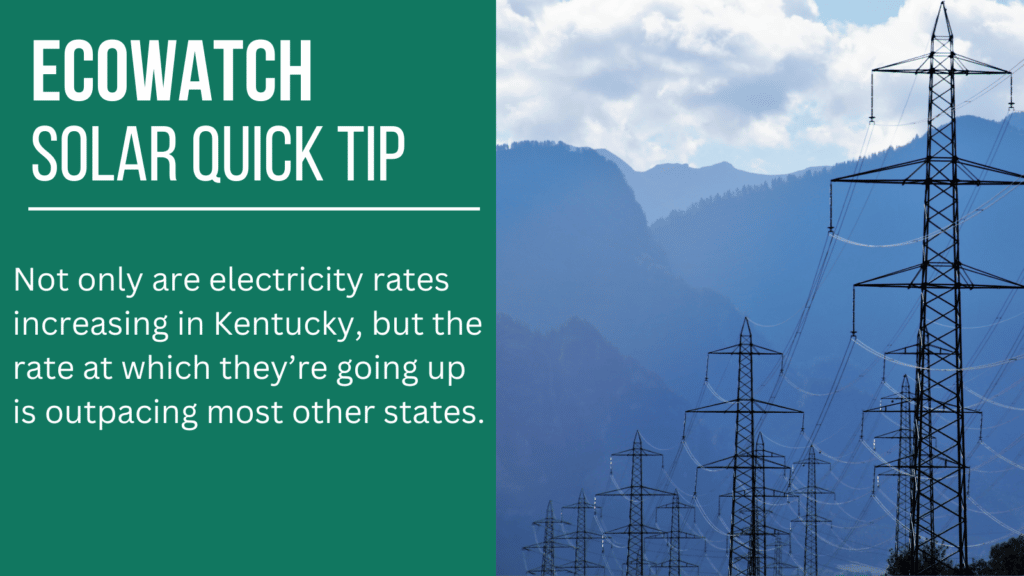
Kentucky Solar Incentives (Rebates, Tax Credits & More in 2024)
In this guide to Kentucky’s solar incentives, you’ll learn:
- What solar incentives are available in Kentucky?
- How do you file for the federal solar tax credit in Kentucky?
- How can solar incentives save you money on renewable energy systems in Kentucky?
Each product and or company featured here has been independently selected by the writer. You can learn more about our review methodology here. If you make a purchase using the links included, we may earn commission.
Do Kentucky Solar Incentives Make It Affordable for Homeowners to Go Solar?
Solar Energy has become increasingly popular in recent years, as such there are a handful of solar benefit programs available in Kentucky, all of which can help make converting to solar energy more affordable and accessible for state residents.
Kentucky currently doesn’t have a Renewable Portfolio Standard (RPS) goal to promote solar adoption. It’s also ranked among the slowest states in terms of solar adoption by the Solar Energy Industries Association (SEIA).1 As such, Kentucky’s solar incentives aren’t as enticing as in other states, but they can still be helpful.
Most Kentucky residents pay an average of $33,600 for solar panels before any incentives, or around $23,562 after the federal investment tax credit (ITC) is applied. In addition, other incentives can bring down the effective cost of solar conversion even more.

Blue Raven Solar
Pros
- Industry-leading in-house financing
- Competitive pricing
- Excellent reputation
Cons
- Doesn't offer solar batteries (coming 2022)

Blue Raven Solar
Pros
- Industry-leading in-house financing
- Competitive pricing
- Excellent reputation
Cons
- Doesn't offer solar batteries (coming 2022)

Icon Solar
Regional Service
Average cost
Pros
- Many years of experience
- Comprehensive service offerings
- Great warranty coverage
Cons
- No leases or PPAs
In the table below, we’ll include a complete list of all of the incentives available for solar customers in Kentucky. We’ll also look at each of these perks in the following sections, explain the benefits and offer guidance on how to apply.
| Solar Incentives in Kentucky | Incentive Type | Description | Occurrence | Estimated Dollar Amount You Can Save |
| Federal Solar Investment Tax Credit (ITC) | Federal | Credit to your income tax liability for 30% of your entire solar panel system value | One-time: Applied when you file your taxes for the year you install your solar panel system | $10,098 on average in Kentucky |
| Kentucky Property-Assessed Clean Energy (PACE) Financing | State | A solar financing option that keeps initial and ongoing costs to a minimum — currently only available to small businesses and larger commercial customers | One time: Applied after program registration | Varies based on system size, long-term energy savings and how you use the savings |
| Kentucky Incentives for Energy Independence | State | Credits to your income taxes for commercial customers who don’t use fossil fuels as an energy source | One time: Applied after program registration | Varies based on system size |
| Net metering | Local | Credits you for excess electricity production beyond what you use. Credits can offset future utility bills | Continuous: Always in effect | Varies based on system size, your monthly energy bills and several other factors |
| Other local incentives | Local | Cash-back incentives for energy efficiency upgrades (not for photovoltaic [PV] equipment specifically) | One time: Applied after program registration | Ranges from $50 up to $2,000, depending on the specific upgrade you make |
What Do Kentuckians Need to Know About the Federal Solar Tax Credit?
The federal solar tax credit is the most substantial financial incentive available to solar customers in the Bluegrass State. It provides a credit to your income tax liability — the amount you owe to the federal government — for 30% of your entire system value.
The federal credit has been around since the early 2000s and was previously set to expire in 2024. However, thanks to the Inflation Reduction Act, the credit was renewed in 2022. The new rate schedule is as follows:
- The credit rate will be 30% for systems installed between 2022 and 2031
- The credit rate will drop to 26% in 2033
- The credit rate will drop to 22% in 2034
- The credit will no longer be available in 2035
Kentucky homeowners typically require a solar system that’s around 11 kilowatts (kW), which is above the national average due to the high rate of energy consumption and electricity rates in the state.2 With the average per-watt cost of solar PV equipment in Kentucky hovering around $3.06, that means the typical solar customer will see a tax credit of around $10,098.
It’s important to understand the federal credit is not a cash-back incentive, but rather a tax credit. The average of $10,098 will get credited to your tax burden for the tax year you installed your system. If you don’t owe taxes to the federal government, you won’t be able to take the credit. You can, however, take a partial credit and roll over the remaining amount for up to five years.
How to Claim the Federal Credit in Kentucky
Filing for the federal credit in Kentucky is a breeze, and it requires minimal time on your part. You can follow the steps below to ensure you take full advantage of this solar incentive.
- Step 1: When you’re ready to file your taxes, print out IRS form 5695. Note, you can only claim the credit for the tax year after you install your solar system.
- Step 2: Fill out the form in its entirety. You’ll need basic information about your solar panel company and system — like the cost, system size and the address where it’s installed.
- Step 3: Once completed, file the form along with your taxes, or have your accountant file it for you. If you use tax software like TurboTax or H&R Block, the program should ask automatically if you’ve installed solar. Just report that you have, and the program will walk you through the next steps.
EcoWatch’s Opinion of the Federal ITC in Kentucky
The federal credit is one of the most substantial credits for solar equipment in the country. Not only can it reduce your effective cost of solar panels by over $10,000, but it’s also super simple to file for. The amount of time you spend filling out the IRS form is well worth it, given the return on investment.
The federal credit is specifically important and helpful in a place like Kentucky, which has a general lack of solar incentives. It’s the only tax credit available in the Bluegrass State, so it’s especially important to consider.
If you think you’ll owe money on your taxes over the next five years, we recommend that you take advantage of the credit.
What You Should Know About the Kentucky PACE Financing Program
PACE financing is a great way for solar customers to adopt solar energy without having to pay the state average of $25,000+ for equipment upfront. This financing program keeps interest rates low and down payments to a minimum to make renewable energy more accessible. Plus, it makes paying for your system easy by adding the monthly charges to your property tax bill.
It’s difficult to say how much PACE financing can save you on your system, but it can be the difference between being able to install solar and not having access to PV equipment at all.
Given the average lifetime savings of converting to solar in Kentucky — around $20,247 — PACE financing can be quite beneficial. These average savings are based on a cash purchase, though, so your savings may be lower due to longer-term financing costs.
PACE financing is currently only available for commercial customers in Kentucky. However, there is state legislation that could make this option legal for residential purposes as well, so it’s possible a residential program could become available in the future.
How to Claim PACE Financing in Kentucky (Currently for Commercial Customers Only)
Applying for PACE financing is relatively straightforward, but it can be a bit time-consuming. Below, we’ll detail the general steps you’ll need to take if you’re a commercial solar customer.
- Step 1: Go to KYPACE.org to see if you qualify for PACE financing.
- Step 2: If you do qualify, fill out the application to be considered for PACE financing.
- Step 3: Once you’re approved, you’ll be contacted by a program administrator who will walk you through the next steps. These include choosing a solar installer, having your system installed and finalizing your installation by commissioning the equipment.
EcoWatch’s Opinion of PACE Financing in Kentucky
Unfortunately, PACE financing is currently only available to commercial solar customers in Kentucky. But, as we previously mentioned, there is state legislation that makes it possible for a residential program to also be established.
If you are a commercial customer who qualifies for PACE financing, we recommend you consider the program carefully. While it can be a great way to adopt solar without having to pay expensive prices for your equipment upfront, it does come with some downsides.
Most notably, the monthly payment for your system will get added to your property tax bill. That means if you sell your property before the loan is paid off, the new owner will become responsible for the remaining monthly payments. This can make your property less appealing and less valuable to buyers.
As such, we only recommend applying for PACE financing if you are not able to afford a cash purchase or traditional solar loan, and if you plan to remain in your building for the 15 to 20 years a PACE loan often takes to pay off.
Watch Below: Learn What To Know Before Going Solar in Kentucky
What You Should Know About the Kentucky Incentives for Energy Independence
The Kentucky Incentives for Energy Independence is available to commercial customers only, but is a great option for reducing the effective cost of solar arrays.
For companies that qualify, the following perks are available under this program:
Up to 100% tax exemption for solar sales tax and use tax, which can lower the initial cost of PV equipment
- Severance tax incentives for cutting ties with fossil fuel providers — up to 80%
- Significant tax credits for the cost of the system, up to 100% for corporations
- Wage incentives offered on a per-employee basis
How to Enroll in the Kentucky Incentives for Energy Independence
Enrolling in this incentive program is relatively straightforward, although confirming that you qualify can be a bit time-consuming. You can follow the following steps to enroll:
- Step 1: Go to the Kentucky Economic Development Finance Authority’s (KEDFA) website and fill out the application. There is a $1,000, non-refundable application fee. There are also expensive administrative fees — up to $50,000 — although they can pale in comparison to the amount of money your company could save with this perk.
- Step 2: Wait for approval from the Office of Energy Policy and the Department of Revenue.
- Step 3: Enter into the formal agreement with KEDFA, then proceed with permitting and installing your system.
EcoWatch’s Opinion of the Kentucky Incentives for Energy Independence
This program is a great option for commercial solar customers in Kentucky to save money on solar panel installation. However, it’s expensive to apply and can take some time to confirm you’ll qualify, which you’ll want to do before applying.
Overall, we recommend applying if you’re certain you’ll be accepted, but we suggest skipping this incentive (and saving the application fee) if you’re unsure or suspect you might not be eligible.
Net Metering in Kentucky
Net metering — also called net energy metering — is a billing policy that utility companies offer to incentivize solar adoption.
Through interconnection with the power grid, net metering allows you to overproduce electricity with your panels, earn credits for the excess energy and then use those credits to pay down future bills if your consumption is higher than production.
Net energy metering is mandated by the state of Kentucky for all investor-owned utilities (IOUs) and electric cooperatives, except for the Tennessee Valley Authority (TVA). Provided you’re not a customer of this utility provider, the energy credits you earn will be for the full retail rate, which is the best-case scenario.
Net energy metering policies are changing across the country, usually for the worse. While there is no current legislation or plan to decrease the credit rate in Kentucky, it’s possible the credit rate could become less desirable in the future.
This is especially true because the state does not currently have a Renewable Portfolio Standard (RPS) goal, which usually serves to incentivize companies to offer perks like net energy metering.
How to Enroll in Net Metering in Kentucky
Enrolling in net energy metering is a simple process in Kentucky, which makes it all the more beneficial for solar customers. The steps below can help you ensure you take full advantage of this incentive.
- Step 1: Contact your utility company to check if you have a bi-directional meter installed on your home. If you don’t, ask your provider to install one at no cost to you.
- Step 2: Proceed with your solar installation. You don’t need to choose a specific installer to utilize net energy metering, so you can choose the solar company best for your needs.
- Step 3: Check your first few utility bills after installation to ensure your energy production is getting credited.
EcoWatch’s Opinion of Net Energy Metering in Kentucky
Net energy metering is an outstanding incentive that doesn’t cost you much time or energy to take advantage of. The program provides the following benefits:
- Maximizes your long-term savings
- Helps trim the payback period of your panels by helping to reduce your utility bills
- Regulates your electric bills, which is important in Kentucky where consumption is above-average
We recommend taking advantage of net energy metering if you can, and you should be able to as long as you’re not a TVA customer.
Local Solar Incentives in Kentucky
Kentucky homeowners also have access to quite a few local incentives. Although none of these initiatives are specifically solar rebates, they can help make energy-efficiency home improvements more accessible and affordable. We’ll provide a brief list of the available incentives below.
- Blue Grass Energy Cash-Back Incentive: Blue Grass Energy customers can get up to $750 in cash-back incentives for installing energy-efficient equipment like heat pumps, air sealing and insulation.
- Cumberland Valley Electric Rebates:Customers of Cumberland Valley Electric have access to rebates ranging from $50 to over $1,300 for a variety of energy-efficiency home upgrades, like heat pumps, energy-efficient appliances and more.
- Duke Energy Rebates: Duke Energy provides rebates of up to $450 for solar water heating equipment, energy-efficient HVAC equipment and more.
- Jackson Energy Cooperative Rebate Programs: Jackson Energy Co-op provides rebates for weatherization upgrades.
- Louisville Gas & Electric Company (LG&E) and Kentucky Utilities (KU) Rebates: Customers of LG&E and KU can take cash-back incentives up to $750 for new heating and cooling equipment and energy-efficient appliances.
- Taylor County RECC Cash-Back Incentives: Customers of Taylor County RECC can get access to rebates for installing things like heat pumps and energy-efficient windows, doors and insulation in new construction.
Which Tax Incentives Are Best in Kentucky?
Above, we’ve provided a comprehensive list of all of the incentives available for solar conversion and efficiency upgrades in Kentucky. However, not all of these perks are as valuable as others. Below, we’ll discuss the incentive programs we believe are the most valuable in your area and will provide the biggest return on your time and energy.
Federal Tax Credit
In our opinion, the federal credit is the one incentive you don’t want to miss as a Kentuckian. Not only does this incentive take a minimal amount of time to apply for, but it also provides the most effective savings.
You’ll have to file out a single form to apply, which should take just a few minutes, but in doing so you can reduce your effective solar panel cost by an average of $10,098 in Kentucky.
Net Energy Metering
Net energy metering is the other must-take incentive in Kentucky, in our opinion. This program is available to all property owners who aren’t customers of Tennessee Valley Authority, and you’re guaranteed to get the full retail value for all excess energy your panels generate.
This program can reduce your panel payback period, maximize your long-term savings and help keep energy costs level and fair.
What Kentucky Residents Need to Know About SRECs/TRECs
Solar renewable energy certificates (SRECs) are offered to solar customers in some states as an incentive for producing solar energy. You can earn one certificate for every 1,000 kilowatt-hours you generate, and you can then sell your SRECs for a profit.
Since Kentucky doesn’t currently have an RPS goal, electric companies are not required to generate a specific amount of energy via renewable sources or offset fossil fuel production with energy credits. As such, there is no SREC market to entice sustainability in Kentucky.
That could change if the state does implement an RPS goal in the future, but there’s currently no sign of that happening.
What’s the Near-Term Outlook for More Incentives in Kentucky?
Solar incentives change regularly from state to state, so it’s always possible that the incentives mentioned above will improve or become less appealing in the future. At this time, there is no plan in place for incentives to become better or worse in Kentucky.
If something were to change, it would likely be the net metering policy. Right now, net metering is mandated for all companies other than TVA, and the credit rate is equal to what you pay per kilowatt. Since Kentucky doesn’t have an RPS goal, that incentive could go down to an avoided-cost rate, which is still beneficial but not as appealing as the full retail value.
It’s also worth noting that the federal credit rate is scheduled to drop in the future, although you have another 10 years or so before that happens. The current rate is 30%. That will dip to 26% in 2032 and to 22% in 2033. The credit will no longer be available in 2034.
The cost information presented in this article is derived from a comprehensive analysis, incorporating data from multiple industry sources. The average cost per watt per state was calculated based on figures from Consumer Affairs, Energy Sage, and Berkeley Lab’s Electricity Markets & Policy Department. Additionally, monthly energy consumption and the average monthly cost of electricity were sourced from the U.S. Energy Information Administration, ensuring a well-rounded and accurate representation of the information presented.
FAQ: Kentucky Solar Incentives
Here at EcoWatch, we field many questions from Kentucky homeowners who are interested in going solar. Here are some of the more common queries we see: If you have specific questions that aren’t answered here, reach out to our team of solar experts at solar@ecowatch.com.
There is currently no legislation or plan in place to increase solar incentives in Kentucky over the next two years. However, Kentucky is one of the few states that doesn’t have a Renewable Portfolio Standard (RPS) goal in place. If it does set one, utility providers would likely offer additional incentives to help meet that goal.
The Inflation Reduction Act means two major things for solar power systems in Kentucky: the federal credit is now available until 2033, and the cash-back incentives available for electric vehicles (EVs) are significantly more appealing. Calculating your IRA return has never been easier with Ecowatch’s tools and support.
The federal credit was bumped back up to 30% of your solar power system value until 2031 when it will drop each year for two years and then no longer be available in 2034. The electric vehicle credit toward your tax burden has also gotten more beneficial, as it now tops out at $7,500.
Many states are seeing solar incentives become less appealing as RPS goals are met and solar gains popularity. While there are no current plans to reduce solar incentives in Kentucky over the next two years, there could be some detrimental changes.
The most likely change, if one does occur, would be the net metering rate dropping below the retail price for electricity. Again, there’s no formal plan for this to happen so for time being, the incentive will remain available to all Kentucky residents.
You can always check the Database of State Incentives for Renewables & Efficiency (DSIRE) for updated information
Related articles
Top Solar Installers in Kentucky Cities
Comparing authorized solar partners
-
- Industry-leading in-house financing
- Competitive pricing
- Excellent reputation
- Doesn't offer solar batteries (coming 2022)
A+Best Solar Financing2014Trina Solar, Canadian Solar, SolarEdge, Silfab, SunPower25-year manufacturer warranty; 10-year workmanship warranty, 2-year production guarantee
Having trouble deciding? Click below and use our process to receive multiple quotes instead:

 233k
233k  41k
41k  Subscribe
Subscribe 








